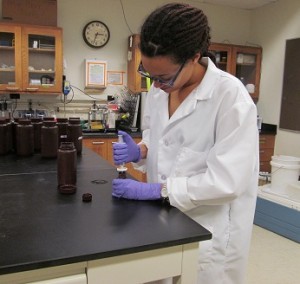August 26, 2014
Two Peas in a Pod
Posted by Fushcia Hoover
By Fushcia Hoover
I am a scientist. I am also an engineer. Mostly, I’m a current PhD student trying to avoid thinking about my pending preliminary exams coming up in the fall. But perhaps more importantly, I am motivated to use my science and engineering degrees to support positive changes in our environments. This is undoubtedly a never-ending search, but recently I have turned to public policy, which in part led me to my internship with the Public Affairs department at AGU. As my tenure draws to a close this week, I took the time to reflect on the things I’ve learned and why I am even more motivated to stay involved in science policy.

Fushcia Hoover filters rainwater runoff samples from a local green roof during her master’s research. Credit: Christal Musser
Science + Policy = Good Things
Being a good researcher, scientist and/or engineer is more than the number of grants, publications and conference presentations you have given. Take your research to the next level. Bring it to your community, your neighborhood, and your legislators. Engaging others in your research and engaging in the policies that impact your research can be just as important as our models, lab, and field work. So here is a list of key things I will be taking away from my internship this summer and why I’m committed to being a scientist who is actively engaged in policy.
- Start making new connections through social media. While the idea of using Twitter as a networking forum can be off-putting or intimidating, and is sometimes laughable, it is actually a great and simple way to connect with scientists, policy makers, and others whom you may not meet otherwise. One of my very first responsibilities at AGU was to manage the science policy Twitter account. So I signed up, and started reading about the art of Twitter, using hashtags, and creating a network. I still wasn’t sold on it until a few weeks ago, when something amazing started happening. I started getting followed by others, and what’s more, the people following me were like-minded scientists and researchers from across the country and around the world. These people represent future research collaborations and relationships with policy makers and legislators.
- Combined there are 535 representatives and senators…20 have PhDs…that’s 4 percent. This statement is not to detract from the value of other degrees or life paths. However, a doctorate is one of only a few degrees that train you to investigate a problem and search for all possible solutions. Methodology and procedure are ingrained into our education and approach to research particularly as scientists. From my observations of Capitol Hill, our Congress could use more individuals who can approach policy-related issues and legislation with the same precision and rigor found in the scientific method.

Fushcia Hoover is currently working on her PhD in Ecological Sciences and Engineering at Purdue. Credit: Kara Smedley
- No one knows your research better than you. Congress makes decisions about what types of research to fund, and how much. It can be a struggle to take the detailed research you work on every day and summarize the most important high-level aspects for those who are not scientists. But I keep at it because legislators need information about the value of science funding from those who see it every day.
- It’s a lot of fun! When I went into my Senator’s office to talk about the importance of climate change research and its impact on the Indiana economy, I was almost as nervous as I was during my master’s thesis defense. I read all about visiting your legislator and I researched the Senator’s voting records and website before the meeting. During the meeting I talked about my work and the work of others with the Legislative Director and it felt great! I probably didn’t change his mind, or the Senator’s. But I walked out of the office feeling invigorated, empowered, and excited about what I had just accomplished. What did I accomplish you ask? I offered myself, and my network, as scientific resources for their office. I came in and said ‘let me use my science to help your office’.
- Only You Can Fight Forest Fires It is easy to complain and lament for a Congress that would better support our research. There’s a solution for that seemingly unrequited hope and it’s called getting involved. Scientists, it is time to step up to the plate and insert ourselves into the policy conversation. Be your own advocate. As a scientist, you know the importance and relevance of your research better than anyone else. This means that you are also responsible for communicating that importance to those outside your research. You may not get any points towards tenure or an increase in accepted manuscripts, but I bet the peace of mind that will come with having a strong conviction and doing something about it will make it worthwhile.
Fushcia Hoover is an intern with the AGU’s Public Affairs department and a PhD student.

